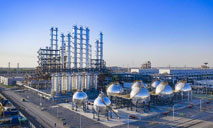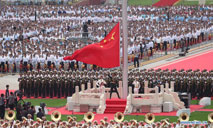Russian ambassador elaborates on CPC’s success at CPC and World Political Parties Summit

Andrei Denisov, Russian Ambassador to China, answers questions during an interview at the CPC and World Political Parties Summit held in Beijing, July 6, 2021. (People's Daily Online/Meng Bin)
--CPC members have one thing in common: dedication to serving the people
“The reason why the Communist Party of China (CPC) is China’s governing party lies in the fact that it stands ready to overcome difficulties (to deliver to its people),” said Russian Ambassador to China Andrei Denisov during an interview in Beijing on July 6.
He made the comment before joining over 10,000 international representatives in attending the CPC and World Political Parties Summit, at which Chinese President Xi Jinping delivered a keynote speech and 21 leaders of world political parties and organizations also spoke at the grand event.
As a veteran of the diplomatic field who has worked in China over the last fifty years, the ambassador provided his insights on the CPC’s achievements and marveled at the transformation China has been undergoing over the past few decades under the leadership of the CPC.
“I’ve been working in China intermittently for half a century, and I am no stranger to this nation,” said the ambassador, who then cited China’s fight against pollution as an example to illustrate how the CPC has always met the major targets it has set in a bid to achieve tangible results.
“Environmental pollution was an important issue in China,” he said, “and I know quite clearly that it used to be a major problem… But from my personal perspective, since 2015, the environment in Beijing has improved significantly. Everyone who lives in Beijing can see this (dramatic change),” the ambassador noted.
“We all know that Chinese President Xi Jinping has formulated a series of far-sighted goals, and as I mentioned before, in the past five years we have seen tangible results and accomplishments,” said Mr. Denisov, who strongly believes that China will meet its targets for carbon peak by 2030 and carbon neutrality by 2060, and that China’s leadership will set even higher and more ambitious targets.
The ambassador firmly believed that China, under the CPC’s leadership, will meet its targets, as he pointed out that all the major goals set by the CPC over the past decades have been achieved, including those that concern environmental protection.

Citizens enjoy the scenery of blooming flowers by Yongding River in Daxing District of Beijing, capital of China, April 24, 2021. (Xinhua/Li Xin)
Echoing his remarks at the 9th World Peace Forum hosted by Tsinghua University from July 2 to 4, Mr. Denisov revisited the topic of the Chinese model. He highlighted that, unique as it is, China’s development model, like various models around the world, has demonstrated to the world its merits and helped to promote the nation’s economic development while improving people’s livelihoods. The ambassador held that the effectiveness of the Chinese model has been fully demonstrated in the fight against the COVID-19 epidemic.
The ambassador also warns certain countries against attaching labels to disparate development models. “I’m completely against the practice of labeling different development models or mentioning those models in the same breath,” he explained, adding that the severe problems facing all of mankind at present call for the whole world to come up with an optimal solution by drawing from different models and then putting it into practice. “We shouldn’t let various development models collide or allow those differences to bring about contradiction and conflict, especially for those who readily apply double standards in the discussions (regarding development models).”
“That’s why I offered the following view at the World Peace Forum. I said, Chairman Mao once proposed that the fundamental principle of the CPC is ‘serving the people’. Is there anything wrong with that?
“Similarly, in his speech at the CPC’s centenary ceremony on July 1, President Xi Jinping stressed the CPC’s people-centered philosophy of development and the Party’s aspiration of seeking happiness for the Chinese people. Is there anything incorrect in that?” he asked.
The ambassador deemed that the aforementioned policies and principles upheld by the CPC are vitally important. Equally significant is the Party’s determination to put those policies and principles into practice. Switching from Russian to Chinese, the ambassador put it that the CPC’s success as a governing party is derived from the implementation of its policies despite hardships, saying that “there’s a phrase in China: 落实政策 (literally, implementation of a policy), which means (designing) policies is one thing and putting them into practice is another. The two links need to be considered as a whole instead of two (optional) parts.”

Russian Ambassador to China Andrey Denisov (center) and another 59 diplomats from the Russian Embassy in China visit the Museum of the Communist Party of China on July 5. Photo: cnsphotos
When asked about one of his strongest memories related to the CPC and its party members, the ambassador recalled an old friend he made in the last century. “My work in China dates back to the 1970s. Since then, I have met a host of CPC Party members from different walks of life,” he said, “and they have one thing in common: that is, they are dedicated to serving the people.”
“For example, one of the party members I knew was Ni Zhifu. He was a model worker in the 1950s before he began his political career and later became the chairman of the All-China Federation of Trade Unions in the 1990s.
“From an ordinary worker to a political leader, Mr. Ni, through great efforts, followed an extraordinary path in life. In my eyes, he hadn’t changed at all since his election to the leading post. When he served in his prominent role, what concerned him the most was still the people, the people he had wholeheartedly served,” he said.
At the end of the interview, the Russian ambassador shared his account of how China has transformed over the past decades. “With my own eyes, I witnessed the living conditions of the Chinese people forty years ago. I can still clearly remember their salaries, the colors of the clothes they wore, and I can see the tremendous changes the country has experienced.”
But the ambassador did not go further in utilizing statistics to “gauge” China’s economic and social transformation, as he believed the living cases are more vivid and convincing than figures.
“I can still remember during the period from the 1980s to the 1990s, people from Guangdong Province used to find jobs in Hong Kong. But now, the opposite happens. People from the Hong Kong SAR are searching for suitable working opportunities in Shenzhen and other places in Guangdong province,” he said.
“In the 1990s, girls from Guangdong were probably very willing to find their future husbands in Hong Kong. Again, now the contrary may be the case. I think this says more about the country’s transformation than any numbers,” the ambassador quipped.

An aerial view of the 599-meter Ping An International Finance Centre, the fourth-tallest building in the world, in Shenzhen, Guangdong province. [Photo by Wu Luping/For China Daily]
Photos
Related Stories
- Highlights of foreign congratulatory messages on CPC's 100th founding anniversary (53)
- Highlights of foreign congratulatory messages on CPC's 100th founding anniversary (52)
- "Well-off society" marks historic milestone in China's progress
- Book, film introducing CPC history published in Britain
- Vice premier stresses Party history learning for better rural vitalization
- Join Hands, for the People
- Serbian ruling party leaders hail relations with China
- Namibian ruling party officials laud CPC's forward-looking policies
- Panchen Lama pays tribute to CPC centenary
- How does the CPC garner overwhelming support from the Chinese people?
Copyright © 2021 People's Daily Online. All Rights Reserved.










